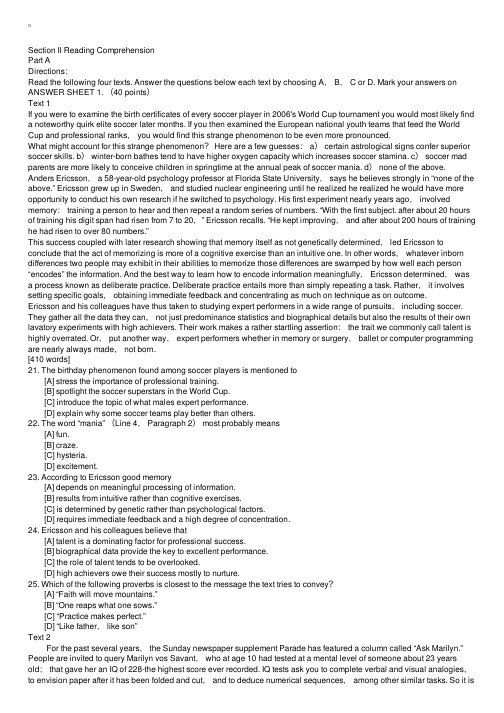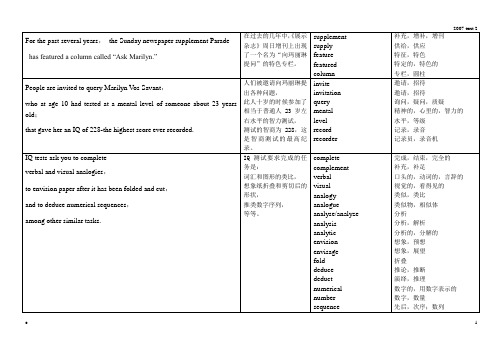2007-考研《英语二》真题及答案解析
考研英语二2007年真题

考研英语二2007 年真题Section 1I Cloze (10 points)Directions:For each numbered blank in the following passage.there are four choices marked A, B, C and D. Choose the best one and mark your answer on the ANSWER SHEET with a pencil.Advancing age means losing your hair, your waistline and your memory,right ? Dana Denis is just 40 years old,but 2 1 she's worried about what she calls' my rolling mental blackouts." "I try to remember something and I just blank out,"she saysYou may 22 about these lapses,calling them " senior moments "or blaming "early Alzheimer's (老年痴呆症)."Is it an inescapable fact that the older you get,the 23 you remember Well, sort of.But as time goes by, we tend to blame age 24 problems that are not necessarily age-related."When a teenager can't find her keys,she thinks it's because she's distracted or disorganized, "says Paul Gold."A 70-year-old blames her 25 ."In fact,the 70-year-old may have been 26 things for decades.In healthy people,memory doesn't worsen as 27 as many of us think."As we 28,the memory mechanism isn't 29 ,"says psychologist Fergus Craik."It's just inefficient."The brain's processing 30 slows down over the years,though no one knowsexactly 31. Recent research suggests that nerve cells lose efficiency and 32 there's less activity in the brain.But, cautions Barry Gordon,"It's not clear that less activity is 33 .A beginning athlete is winded (气喘吁吁)more easily than a 34 athlete.In the same way, 35 the brain gets more skilled at a task,it expends less energy on it."There are 36 you can take to compensate for normal slippage in your memory gears,though it 37 effort.Margaret Sewell says:"We're a quick-fix culture, but you have to 38 to keep your brain 39 shape.It's like having a good body.You Can't go to the gym once a year 40 expect to stay in top form."21.A. almost B. seldom C. already D. never22.A. joke B. laugh C. blame D. criticize23.A. much B. little C. more D. less24.A. since B. for C. by D. because25.A. memory B. mind C. trouble D. health26.A. disorganizing B. misplacing C. putting D. finding27.A. swiftly B. frequently C. timely D. quickly28.A.mature B. advance C. age D. grow29.A. broken B. poor C. perfect D. working30.A. pattern B. time C. space D. information31.A . why B. how C. what D. when32.A. since B. hence C. that D. although33.A. irregular B. better C. normal D. worse34.A. famous B. senior C. popular D. trained35.A. as B. till C. though D. yet36.A. stages B. steps C. advantages D. purposes37.A. makes B. takes C. does D. spends38.A. rest B. come C. work D. study39.A. to B. for C. on D. in40.A. so B. or C. and D. ifSection Ⅲ Reading Comprehension (40 points)Directions: There are 4 passages in this part, Each passage is followed by some questions or unfinished statements. For each of them there are four choices marked A, B, C, and D. You should decide on the best choice and blacken the corresponding letter on the ANSWER SHEET with a pencil. Questions 41 to 45 are based on the following passage:Prior to the 20th century, many languages with small numbers of speakers survived for centuries. The increasingly interconnected modern world makes it much more difficult for small language communities to live in relative isolation, a key factor in language maintenance and preservation.It remains to be seen whether the world can maintain its linguistic andcultural diversity in the centuries ahead. Many powerful forces appear to work against it :population growth, which pushes migrant populations into the world's last isolated locations; mass tourism; global telecommunications and mass media; and the spread of gigantic global corporations. All of these forces appear to signify a future in which the language of advertising, popular culture, and consumer products become similar. Already English and a few other major tongues have emerged as global languages of commerce and communication. For many of the world's peoples, learning one of these languages is viewed as the key to education, economic opportunity, and a better way of life.Only about 3,000 languages now in use are expected to survive the coming century. Are most of the rest doomed in the century after that Whether most of these languages survive will probably depend on how strongly cultural groups wish to keep their identity alive through a native language. To do so will require an emphasis on bilingualism(mastery of two languages). Bilingual speakers could use their own language in smaller spheres---at home, among friends, in community settings---and a global language at work, in dealings with government, and in commercial spheres. In this way, many small languages could sustain their cultural and linguistic integrity alongside global languages, rather than yield to the homogenizing (同化的)forces of globalization.Ironically, the trend of technological innovation that has threatenedminority languages could also help save them. For example, some experts predict that computer software translation tools will one day permit minority language speakers to browse the Internet using their native tongues.Linguists are currently using computer-aided learning tools to teach a variety of threatened languages.For many endangered languages, the line between revival and death is extremely thin. Language is remarkably resilient (有活力的),however. It is not just a tool for communicating, but also a powerful way of separating different groups, or of demonstrating group identity. Many indigenous(原生的,土著的)communities have shown that it is possible to live in the modern world while reclaiming their unique identities through language.41.Minority languages can be best preserved in __________.A.an increasingly interconnected worldB.maintaining small numbers of speakersC.relatively isolated language communitiesD.following the tradition of the 20th century42.According to Paragraph 2, that the world can maintain its linguistic diversity in the future is _______.A.uncertain B.unrealistic C.foreseeable D.definite43.According to the author, bilingualism can help_________.A.small languages become acceptable in work placesB.homogenize the world's languages and culturesC.global languages reach home and community settingsD.speakers maintain their linguistic and cultural identityputer technology is helpful for preserving minority languages in that it_________.A.makes learning a global language unnecessaryB.facilitates the learning and using of those languagesC.raises public awareness of saving those languagesD.makes it easier for linguists to study those languages45.In the author's view, many endangered languages are________. A.remarkably well-kept in this modern worldB.exceptionally powerful tools of communicationC.quite possible to be revived instead of dying outD.a unique way of bringing different groups togetherQuestions 46 to 50 are based on the following passage:Everyone,it seems,has a health problem 。
2007年考研英语完形真题及答案解析(二)

2007年考研英语完形真题及答案解析(二)1. 【解析】[B] 词汇辨析题。
独立后的国家居民由原住民和移民共同构成,因此,强干扰项A可排除。
而居民既包括原住民也包括移民,故选[B]。
2. 【解析】[D] 语义衔接题。
前一句指出各殖民地已经独立,所以人们对未来的态度应该是积极的,而“充满希望地”与“对未来的展望”应该是最恰当的。
3. 【解析】[A] 语义衔接题。
我们从the ideals of representative government, careers to talent, freedom of commerce and trade, the to private property, and a belief in the individual as the basis of society…这些字里行间看出这些ideas是现代制度和法律所支持的观念,虽然这些领导人出身于旧政体和伊比利亚殖民主义的危机之中,他们(选择)分享这些观念。
可先排除否定意义的B、D项。
C项attain这个词一般指的是通过不断的努力获得某种知识或达到某个目标。
因此,正确答案为A,许多独立国家领导人都认同议会政府。
4. 【解析】[C] 语义衔接/固定搭配题。
本题目选择形容词,在句子中体现前、后名词之间的关系。
many of the leaders of independence shared the ideas of representative government, careers to talent, freedom of commerce and trade,…“许多独立国家领导人都认同议会政府,职业……于人才,商业和贸易自由……”选项A. related to 相关的;B. close to接近;C. open to 公开的;开着的;D. devoted to 奉献的; 投入的。
符合语境的只有C. careers open to talent “职位向有才能的人开放”。
2007年全国硕士研究生考试英语真题及答案2

Section II Reading ComprehensionPart ADirections:Read the following four texts. Answer the questions below each text by choosing A, B, C or D. Mark your answers on ANSWER SHEET 1. (40 points)Text 1If you were to examine the birth certificates of every soccer player in 2006's World Cup tournament you would most likely find a noteworthy quirk elite soccer later months. If you then examined the European national youth teams that feed the World Cup and professional ranks, you would find this strange phenomenon to be even more pronounced.What might account for this strange phenomenon? Here are a few guesses: a) certain astrological signs confer superior soccer skills. b) winter-born bathes tend to have higher oxygen capacity which increases soccer stamina. c) soccer mad parents are more likely to conceive children in springtime at the annual peak of soccer mania. d) none of the above. Anders Ericsson, a 58-year-old psychology professor at Florida State University, says he believes strongly in “none of the above.” Ericsson grew up in Sweden, and studied nuclear engineering until he realized he realized he would have more opportunity to conduct his own research if he switched to psychology. His first experiment nearly years ago, involved memory: training a person to hear and then repeat a random series of numbers. “With the first subject. after about 20 hours of training his digit span had risen from 7 to 20,” Ericsson recalls. “He kept improving, and after about 200 hours of training he had risen to over 80 numbers.”This success coupled with later research showing that memory itself as not genetically determined, led Ericsson to conclude that the act of memorizing is more of a cognitive exercise than an intuitive one. In other words, whatever inborn differences two people may exhibit in their abilities to memorize those differences are swamped by how well each person “encodes” the information. And the best way to learn how to encode information meaningfully, Ericsson determined, was a process known as deliberate practice. Deliberate practice entails more than simply repeating a task. Rather, it involves setting specific goals, obtaining immediate feedback and concentrating as much on technique as on outcome.Ericsson and his colleagues have thus taken to studying expert performers in a wide range of pursuits, including soccer. They gather all the data they can, not just predominance statistics and biographical details but also the results of their own lavatory experiments with high achievers. Their work makes a rather startling assertion: the trait we commonly call talent is highly overrated. Or, put another way, expert performers whether in memory or surgery, ballet or computer programming are nearly always made, not born.[410 words]21. The birthday phenomenon found among soccer players is mentioned to [A] stress the importance of professional training. [B] spotlight the soccer superstars in the World Cup. [C] introduce the topic of what males expert performance. [D] explain why some soccer teams play better than others.22. The word “mania” (Line 4, Paragraph 2) most probably means [A] fun. [B] craze. [C] hysteria. [D] excitement.23. According to Ericsson good memory [A] depends on meaningful processing of information. [B] results from intuitive rather than cognitive exercises. [C] is determined by genetic rather than psychological factors. [D] requires immediate feedback and a high degree of concentration.24. Ericsson and his colleagues believe that [A] talent is a dominating factor for professional success. [B] biographical data provide the key to excellent performance. [C] the role of talent tends to be overlooked. [D] high achievers owe their success mostly to nurture.25. Which of the following proverbs is closest to the message the text tries to convey? [A] “Faith will move mountains.” [B] “One reaps what one sows.” [C] “Practice makes perfect.” [D] “Like father, like son”Text 2 For the past several years, the Sunday newspaper supplement Parade has featured a column called “Ask Marilyn.”People are invited to query Marilyn vos Savant, who at age 10 had tested at a mental level of someone about 23 years old; that gave her an IQ of 228-the highest score ever recorded. IQ tests ask you to complete verbal and visual analogies,to envision paper after it has been folded and cut, and to deduce numerical sequences, among other similar tasks. So it isa bit confusing when vos Savant fields such queries from the average Joe (whose IQ is 100) as, What's the difference between love and fondness? Or what is the nature of luck and coincidence? It's not obvious how the capacity to visualize objects and to figure out numerical patterns suits one to answer questions that have eluded some of the best poets and philosophers. Clearly, intelligence encompasses more than a score on a test. Just what does it means to be smart? How much of intelligence can be specified, and how much can we learn about it from neurology, genetics, computer science and other fields? The defining term of intelligence in humans still seems to be the IQ score, even though IQ tests are not given as often as they used to be. The test comes primarily in two forms: the Stanford-Binet Intelligence Scale and the Wechsler Intelligence Scales (both come in adult and children's version)。
2007年英语二答案解析

英语试题解析Section I Vocabulary and Structure(10 points)1.答案为B。
本题考点为宾结构搭配。
根据上下文,只有B项exerting与后面的pressure 搭配恰当,意为“施加压力”;故选项B为正确答案。
译文:他的妻子一直在给他施压,要他跳槽。
2.答案为A。
本题考点为形容词语义辨析。
extinct意为“灭绝”,其他选项意思不对。
根据题意,A为正确答案。
译文:据估计,目前每年约有50 000个物种灭绝。
3.答案为A。
本题考点为名词的词义辨析。
A项scope意为“(活动)范围,机会,余地”,B项space意为“空间”,c项capacity意为“容量、能力”,D项range意为“范围,射程”。
故选项A符合译文:约翰说他目前的工作不能为他的组织能力提供充分的活动余地。
4.答案为D。
本题考点为名词的词义辨析。
A项意为“可能性”,B项意为“现实”,c项意为“必要性”,D项意为“机会”。
根据上下文,选项D符合题意。
译文:在将来,很多机会将展现在受过大学教育的人的面前。
5.答案为B。
本题考点为几个形近动词的词议辨析。
A项意为“居住”,B项意为“继承”,c项意为“禁止”,D项意为“吸入”。
根据题意,选项B为正确答案。
译文:年轻人在叔父死后继承了漂亮的庄园,从一个穷人变成了有钱的贵族。
6.答案为D。
本题要考的是形容词与名词的搭配。
A项意为“繁荣的”,B项意为“初步的”,c项意为“悲观的”,D项意为“预期的”。
根据题意,选项D为正确答案。
译文:经理正在拜访一个预期的客户,试图说服他签订这项协议。
7.答案为C。
本题考的是名词的词义辨析。
A项意为“复苏”,B项意为“镇压”,c 项意为.“衰退、不景气”,D项意为“恢复”。
根据题意,选项c为正确答案。
译文:1991年,当工业化国家遭遇经济萧条的时候,发展中国家的经济却快速增长。
8.答案为C。
本题考的是动宾结构的搭配。
A项意为“召集”,B项意为“引诱”,c 项意为“激怒”,D项意为“绊倒”。
2007英语二

2007年考研英语二(MBA联考)真题试卷及答案Section II Cloze (10 points)Directions: Read the following text. Choose the best word(s) for each numbered blank and mark A, B, C or D on ANSWER SHEET 1.Advancing age means losing your hair, your waistline and your memory,right ? Dana Denis is just 40 years old,but 21 she’s worried about what she calls’my rolling mental blackouts.””I try to remember something and I just blank out,”she saysYou may 22 about these lapses,calling them ”senior moments ”or blaming "early Alzheimer’s (老年痴呆症).”Is it an inescapable fact that the older you get,the 23 you remember? Well, sort of.But as time goes by, we tend to blame age 24 problems that are not necessarily age—related.“When a teenager can’t find her keys,she thinks it's because she’s distracted or disorganized,”says Paul Gold.“A 70-year-old blames her 25 .”In fact,the 70-year-old may have been 26 things for decades.In healthy people,memory doesn’t worsen as 27 as many of us think.“As we 28 ,the memory mechanism isn’t 29 ,”says psychologist Fergus Craik.”It’s just inefficient.”The brain’s processing 30 slows down over the years,though no one knows exactly 31. Recent research suggests that nerve cells lose efficiency and 32 there’s less activity in the brain.But,cautions Barry Gordon,”It's not clear that less activity is 33 .A beginning athlete is winded(气喘吁吁)more easily than a 34 athlete.In the same way, 35 the brain gets more skilled at a task,it expends less energy on it.”There are 36 you can take to compensate for normal slippage in your memory gears,though it 3 7 effort.Margaret Sewell says:”We’re a quick-fix culture, but you have to 38 to keep your brain. 3 9 shape.It’s like having a good body.You Can’t go to the gym once a year 40 expect to stay in top form.”21.A. almost B. seldom C. already D. never22.A. joke B. laugh C. blame D. criticize23.A. much B. little C. more D. less24.A. since B. for C. by D. because25.A. memory B. mind C. trouble D. health26.A. disorganizing B. misplacing C. putting D. finding27.A. swiftly B. frequently C. timely D. quickly28.A.mature B. advance C. age D. grow29.A. broken B. poor C. perfect D. working30.A. pattern B. time C. space D. information31.A . why B. how C. what D. when32.A. since B. hence C. that D. although33.A. irregular B. better C. normal D. worse34.A. famous B. senior C. popular D. trained35.A. as B. till C. though D. yet36.A. stages B. steps C. advantages D. purposes37.A. makes B. takes C. does D. spends38.A. rest B. come C. work D. study39.A. to B. for C. on D. in40.A. so B. or C. and D. ifSection III Reading comprehension (40 points)Directions:Read the following four passages. Answer the questions below each passage by choosing A, B, C and D. Mark your answers on ANSWER SHEET 1.Passage OnePrior to the 20th century, many languages with small numbers of speakers survived for centuries. The increasingly interconnected modern world makes it much more difficult for small language communities to live in relative isolation, a key factor in language maintenance and preservation.It remains to be seen whether the world can maintain its linguistic and cultural diversity in the centuries ahead. Many powerful forces appear to work against it :population growth, which pushes migrant populations into the world’s last isolated locations; mass tourism; global telecommunications and mass media; and the spread of gigantic global corporations. All of these forces appear to signify a future in which the language of advertising, popular culture, and consumer products become similar. Already English and a few other major tongues have emerged as global languages of commerce and communication. For many of the world’s peoples, learning one of these languages is viewed as the key to education, economic opportunity, and a better way of life.Only about 3,000 languages now in use are expected to survive the coming century. Are most of the rest doomed in the century after that?Whether most of these languages survive will probably depend on how strongly cultural groups wish to keep their identity alive through a native language. To do so will require an emphasis on bilingualism(mastery of two languages). Bilingual speakers could use their own language in smaller spheres---at home, among friends, in community settings---and a global language at work, in dealings with government, and in commercial spheres. In this way, many small languages could sustain their cultural and linguistic integrity alongside global languages, rather than yield to the homogenizing(同化的)forces of globalization.Ironically, the trend of technological innovation that has threatened minority languages could also help save them. For example, some experts predict that computer software translation tools will one day permit minority language speakers to browse the Internet using their native tongues. Linguists are currently using computer—aided learning tools to teach a variety of threatened languages.For many endangered languages, the line between revival and death is extremely thin. Language is remarkably resilient(有活力的),however. It is not just a tool for communicating, but also a powerful way of separating different groups, or of demonstrating group identity. Many indigenous(原生的,土著的)communities have shown that it is possible to live in the modern world while reclaiming their unique identities through language.41.Minority languages can be best preserved in __________.A.an increasingly interconnected worldB.maintaining small numbers of speakersC.relatively isolated language communitiesD.following the tradition of the 20th century42.According to Paragraph 2, that the world can maintain its linguistic diversity in the futureis _______.A.uncertainB.unrealisticC.foreseeableD.definite43.According to the author, bilingualism can help_________.A.small languages become acceptable in work placesB.homogenize the world’s languages and culturesC.global languages reach home and community settingsD.speakers maintain their linguistic and cultural identityputer technology is helpful for preserving minority languages in that it_________.A.makes learning a global language unnecessaryB.facilitates the learning and using of those languagesC.raises public awareness of saving those languagesD.makes it easier for linguists to study those languages45.In the author’s view, many endangered languages are________.A.remarkably well-kept in this modern worldB.exceptionally powerful tools of communicationC.quite possible to be revived instead of dying outD.a unique way of bringing different groups togetherPassage TwoEveryone,it seems,has a health problem。
2007 在职联考 教育硕士 英语二 真题及参考答案

在职攻读硕士学位全国联考教育硕士英语二试卷Contents2007 (2)Section I Use of English (20 minutes, 10%) (2)Section II Reading Comprehension (70 minutes, 50%) (3)Section III Translation (20 minutes, 20%) (11)Section IV Writing (40 minutes, 20%) (13)2007 答案 (13)英语二试卷一[供报考学科教学(英语)专业考生使用]Section ⅠUse of English (20 minutes, 10%)Section ⅡReading Comprehension (70 minutes, 50%) 考生须知1. 本考试分试卷一和试卷二两部分。
试卷一满分60分,考试时间为90分钟,14:30开始,16:00结束;试卷二满分40分,考试时间为60分钟,16:00开始,17:00结束。
2. 请考生务必将本人考号最后两位数字填写在本页右上角方框内。
3. 本试卷一为A型试卷,其答案必须用2B铅笔填涂在A型答题卡上,做在其它类型答题卡或试卷上的无效。
答题前,请核对答题卡是否A型卡,若不是,请要求监考员予以更换。
4. 在答题卡上正确的填涂方法为在答案对应的字母上划线,如[A] [B] [C] [D]。
5. 监考员宣布试卷一考试结束时,请立即停止答试卷一,将试卷一及其答题卡反扣在自己的桌面上,继续做试卷二。
监考员将到座位上收取试卷一及其答题卡。
6. 监考员收卷过程中,考生须配合监考员验收,并请监考员在准考证上签字(作为考生交卷的凭据),否则,若发生答卷遗失,责任由考生自负。
英语二试卷二[供报考学科教学(英语)专业考生使用]Section ⅢTranslation (20 minutes, 20%)Section ⅣWriting (40 minutes, 20%)考生须知1. 试卷二满分40分,考试时间为60分钟,16:00开始,17:00结束。
2007年普通高等学校招生全国统一考试(全国卷II)英语试卷参考答案

2007年普通高等学校招生全国统一考试(全国卷II)英语试卷参考答案第一部分英语知识运用(共三节,满分50分)第一节语音知识(共5小题;每小题1分,满分5分)l. C 2. B 3. A 4. B 5. D第二节语法和词汇知识(共15小题;每小题1分,满分15分)6. D7. C8. A9. B 10. C11. B 12. C 13. A14. D 15. B16. C 17. A18. D 19. B 20. C第三节完形填空(共20小题;每小题1.5分,满分30分)21. C 22. A23. B 24. D 25. A26. D 27. C 28. B 29. B 30. C31. D 32. A33. B 34. C 35. D36. D 37. A38. C 39. A40. B第二部分阅读理解(共25小题,第一节每小题2分,第二节每小题1分;满分45分)第一节,阅读下面短文,从每题所给的四个选项(A、B、C和D)中,选出最佳选项,并在答题卡上将该项涂黑。
41. B 42. C 43. A44. D 45. B46. B 47. C 48. B 49. C 50. A51. D 52. C 53. A54. D 55. A56. B 57. A58. D 59. C 60. A第二节根据对话内容,从对话后的选项中选出能填入空白处的最佳选项。
选项中有两项为多余选项。
61. F62. B63. E64. A65. D第三部分写作(共三节,满分55分)第一节单词拼写(共10小题;每小题1分,满分10分)66. message67. broadcast/broadcasted68. celebrate69. majority70. succeed71. description72. praised73. everywhere74. favo(u)rite75. pink第二节短文改错(共10小题,每小题1.5分,满分15分)Dear Grandpa,Thank you for your letter.My school is organizing a basketball team andthere' s just a chance which I can join it. I'm little of 76. __thatcourse, but terribly quick and bravely. While the others 77. __brave__are jumping about in the air, I can run under my legs 78. ___theirand get the ball. It will be lots of fun for practicing but 79. __for ___in the playground in the afternoon with the tree 80. ___ trees___around us all red and yellow and everybody laughing 81. ___√___and shouting. These are the happier girls I' ve ever 82. __ happiest__seen and I' m the happiest in all! 83. __of___I meant to write ^long letter and tell you all the 84. ____a___things I' m doing at school, but the bell was ringing, 85. ___is____so I just have to stop here.Love,Judy第三节书面表达(满分30分)Welcome to Baishan Mountain HotelBaishan Mountain Hotel is now open for business.Our hotel stands 500 meters away from the entrance to Baishan Mountain. It has 20 afaigle rooms and 15 double rooms, all with hot showers. A single room is 100 yuan and a double room 150 yuan for one night. Y ou are advised to book in advance. The hotel serves three meals a day and there are Chinese food and western food for you to choose from. Y ou can also enjoy yourself at the cafe drinking tea or coffee in the evening. We also have a swimming pool, which is open all day and free of charge.All are welcome!。
2007年考研英语真题Text2解析

analysis
analytic
envision
envisage
fold
deduce
deduct
numerical
number
sequence
similar
完成,结束,完全的
补充,补足
口头的,动词的,言辞的
视觉的,看得见的
类似,类比
类似物,相似体
分析
分析,解析
分析的,分解的
supply
feature
featured
column
补充,增补,增刊
供给,供应
特征,特色
特定的,特色的
专栏,圆柱
People are invited to query Marilyn Vos Savant,
who at age 10 had tested at a mental level of someone about 23 years old;
elude
poet
poem
poetry
philosopher
philosophy
明显的,显著的
能力,容量,资格
形象,想象
视觉的,视力的
物体,目标,反对
反对,不喜欢
目标,客观的,真实的
解决,算出
计算,数字
数值的,数字的
模式,图案,仿制
适合,相称
合适的,适宜的
套间,系列
逃避,躲避
诗人
诗
诗歌,诗集
哲学家,哲人
formula
formulate
scale
version
首先,主要的,根本上
最初的,主要的,基本的
首要的,最好的,
- 1、下载文档前请自行甄别文档内容的完整性,平台不提供额外的编辑、内容补充、找答案等附加服务。
- 2、"仅部分预览"的文档,不可在线预览部分如存在完整性等问题,可反馈申请退款(可完整预览的文档不适用该条件!)。
- 3、如文档侵犯您的权益,请联系客服反馈,我们会尽快为您处理(人工客服工作时间:9:00-18:30)。
写作冲刺
掌握写作大小作文的模版,能利用模版衍生解决应试模版的能力,规范写 作
8
王诚
《考研经综写作冲刺讲义》
写作模考
通过应试技巧的学习,提供写作的速度,发现考试中的问题,及时解决, 提高考试分值
4
王诚
《考研管综写作 4 套卷》
高等数学基础班
全面学习高等数学的基本知识点,理解基本概念,掌握基本运算方法,为பைடு நூலகம்强化提高打下基础。
16
李擂
《考研经综数学基础讲义》
《经济类联考综合阅卷人核心教程》
高等数学
强化课程,依据考试大纲及历真题介绍分别高等数学、线性代数、概率论 主要知识点,归纳总结命题方向和常见的解题思想,结合强化课,帮助考生 进一步强化解题思路。
24
李擂
《经济类联考综合阅卷人核心笔记·数学》
《经济类联考综合阅卷人核心笔记·数学》
逻辑强化
熟悉逻辑各题型的特点和表现形式,能熟练地运用各知识点和相关的逻辑 方法解题
16
饶思中
《考研管综逻辑强化讲义》
《经济类联考综合阅卷人核心笔记·逻辑》
16
饶思中
《考研管综逻辑强化讲义》
《管理类联考数学阅卷人核心笔记·逻辑》
《管理类联考数学阅卷人核心笔记·写作》
《管理类联考数学阅卷人核心笔记·写作》
数学冲刺
管理类联考数学冲刺串讲,系统串联知识体系,指导考生针对核心题深度 学习
8
数学强化
依据考试大纲及历真题介绍管理数学数学主要知识点,归纳总结命题方向 和常见的解题思想。
32
刘京环
《考研管综初数强化讲义》
《管理类联考数学阅卷人核心笔记·数学》
逻辑强化
熟悉逻辑各题型的特点和表现形式,能熟练地运用各知识点和相关的逻辑 方法解题
2007-考研《英语二》真题及答案解析
经济类联考数学全程规划班
掌握经济类联考数学的复习方法,制定全复习规划
1
李擂
《考研经综数学导学讲义》
无
逻辑真题解析
了解逻辑真题的主要考查内容,试题结构,预测逻辑真题的命题趋向
2
王晓东
《经济类联考综合真题及其答案》
24
李擂
《经济类联考综合阅卷人核心笔记·数学》
《经济类联考综合阅卷人核心笔记·数学》
逻辑强化
熟悉逻辑各题型的特点和表现形式,能熟练地运用各知识点和相关的逻辑 方法解题
16
饶思中
《考研管综逻辑强化讲义》
《经济类联考综合阅卷人核心笔记·逻辑》
李擂
《考研经综数学冲刺讲义》
《经济类联考综合阅卷人核心预测 4 套卷》
逻辑冲刺
提高运用各种知识点和逻辑方法解答各种类型的逻辑题的综合能力;消灭 逻辑理解中的盲点和误区;提高解题的速度和正确率
逻辑真题解析
了解逻辑真题的主要考查内容,试题结构,预测逻辑真题的命题趋向
2
王晓东
《考研管综真题》
数学基础
通过学习管理类联考数学的基本概念、基本理论、基本方法,为强化提高 打基础
20
刘京环
《考研管综初数基础讲义-刘京环》
《管理类联考数学阅卷人核心教程》
写作冲刺
掌握写作大小作文的模版,能利用模版衍生解决应试模版的能力,规范写 作
8
王诚
《考研管综写作冲刺讲义》
写作模考
通过应试技巧的学习,提供写作的速度,发现考试中的问题,及时解决, 提高考试分值
4
王诚
《考研管综写作 4 套卷》
写作强化
通过课程学习巩固考研写作的要点重点难点,并掌握写作的大体思路
12
王诚
《经济类联考综合阅卷人核心笔记·写作》
《经济类联考综合阅卷人核心笔记·写作》
冲刺串讲
各科冲刺串讲,系统串讲各科知识体系,指导考生针对核心考点进行深度 学习。
8
李擂
《考研经综数学冲刺讲义》
《经济类联考综合阅卷人核心预测 4 套卷》
逻辑冲刺
提高运用各种知识点和逻辑方法解答各种类型的逻辑题的综合能力;消灭 逻辑理解中的盲点和误区;提高解题的速度和正确率
4
饶思中
《考研经综逻辑冲刺讲义》
《经济类联考综合阅卷人考前 8 天写作大预测》
写作强化
通过课程学习巩固考研写作的要点重点难点,并掌握写作的大体思路
12
王诚
《经济类联考综合阅卷人核心笔记·写作》
《经济类联考综合阅卷人核心笔记·写作》
冲刺串讲
各科冲刺串讲,系统串讲各科知识体系,指导考生针对核心考点进行深度 学习。
8
刘京环
《考研管综初数冲刺讲义》
《管理类联考数学阅卷人核心预测 4 套卷》
逻辑冲刺
提高运用各种知识点和逻辑方法解答各种类型的逻辑题的数学能力;消灭 逻辑理解中的盲点和误区;提高解题的速度和正确率
4
饶思中
《考研管综逻辑冲刺讲义》
《管理类联考数学阅卷人考前 8 天写作大预测》
经济类联考数学全程规划班
掌握经济类联考数学的复习方法,制定全复习规划
1
李擂
《考研经综数学导学讲义》
无
逻辑真题解析
了解逻辑真题的主要考查内容,试题结构,预测逻辑真题的命题趋向
2
王晓东
《经济类联考综合真题及其答案》
高等数学基础班
全面学习高等数学的基本知识点,理解基本概念,掌握基本运算方法,为 强化提高打下基础。
16
李擂
《考研经综数学基础讲义》
《经济类联考综合阅卷人核心教程》
高等数学
强化课程,依据考试大纲及历真题介绍分别高等数学、线性代数、概率论 主要知识点,归纳总结命题方向和常见的解题思想,结合强化课,帮助考生 进一步强化解题思路。
